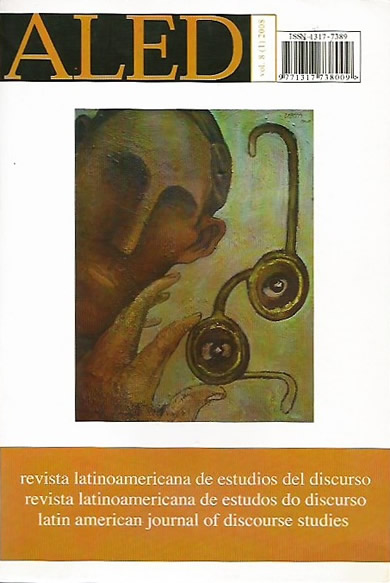El informe de arbitraje como género discursivo en la dinámica de la investigación
Keywords:
genres. peer-review report. interactional analysis. evaluation.Abstract
In this paper we present a first approximation to the study of the peerreview genre (PRG) as a fundamental academic action in the dynamics of research. It is claimed that the categorization of this confidential genre must take into account its relation with other genres in the research context. An interactional analytical framework whose central category is evaluation and which covers the micro and micro dimensions is proposed (Bolívar, 2001, 2005, 2007, 2008). The application of this analysis to a sample of 25 reports reveals a complex network of interaction between editors, reviewers and authors. The PRG is characterized as a genre in the private sphere whose structure and style are shaped in great part by the instructions provided by the editors, and cultural assumptions on interpersonal relations. The implications for genre studies, research processes and academic writing are discussed.
Downloads
References
ACOSTA, O. (2006). Análisis de introducciones de artículos de investigación pu-blicados en la Revista Núcleo 1985-2003, Núcleo 18(23): 9-30.
BEKE, R. (2005). El metadiscurso interpersonal en artículos de investigación,Revista Signos, 38(57): 7-18.
BEKE, R. (2007). Las voces de los otros en el discurso académico de los investigadoresde la educación. Tesis Doctoral, Facultad de Humanidades y Educación.Caracas: Universidad Central de Venezuela.BEKE, R. (2008). El discurso académico: la atribución del conocimiento en lainvestigación educativa, Núcleo, 25: 13-35.
BEKE, R., & BOLÃVAR, A. (en prensa). ‘Certainty and commitment in the cons-truction of academic knowledge in the humanities’, en E. Suomela-Salmi& J. Diver (eds.) Cross linguistic and cross cultural perspectives on AcademicDiscourse. Amsterdam: John Benjamins.
BLANCO, C. (2005). Análisis del discurso e investigación educativa: dos casos deresúmenes de conferencias venezolanas. Revista de Filología y Lingüística dela Universidad de Costa Rica 31 (1), 143.161.
BOLÃVAR, A. (1986). Interaction through written text. A discourse analysis of news-paper editorials. Tesis doctoral. Universidad de Birmingham, U.K.
BOLÃVAR, A. (2001). ‘The negotiation of evaluation in written text’, en M. Scott& G. Thompson (eds.) Patterns of text. In honour of Michael Hoey, pp.129-158. Ámsterdam: John Benjamins
BOLÃVAR, A. (2004).Análisis crítico del discurso de los académicos, Revista Signos37(55): 7-18.
BOLÃVAR, A. (2005a [1994]). Discurso e interacción en el texto escrito. Caracas:Consejo de Desarrollo Científico y Humanístico.
BOLÃVAR, A. (2005b). Tradiciones discursivas y construcción del conocimientoen las humanidades, Signo y Seña 14: 67-91.
BOLÃVAR, A. (2006). ‘La función de la evaluación en artículos y ensayos humanís-ticos’, en J. Falk, J. Gille & F. Weichmeister Bermúdez (coords.) Discurso,interacción e identidad (pp. 109- 136). Estocolmo: Universidad de Esto-colmo.
BOLÃVAR, A. (2007). ‘El análisis interaccional del discurso: del texto a la dinámicasocial’, en A. Bolívar (comp.) Análisis del discurso. Por qué y para qué (pp.247-277). Caracas: Los Libros de El Nacional.
BOLÃVAR, A. (2008). “Cachorro del imperio” versus “cachorro de “Fidel”: losinsultos en la política latinoamericana, Discurso y Sociedad, 2(1) 1-38,www.dissoc.org.
BOLÃVAR, A. & BOLET (en prensa). ‘Las Introducciones y las Conclusiones en elartículo científico’, en A. Bolívar & R. Beke (eds.) Lectura y escritura parala investigación. Caracas: Universidad Central de Venezuela.
CIAPUSCIO, G. E. (2005). Las metáforas en la creación y recontextualización delas ciencias, Signo y seña 14: 183- 211.
CHARAUDEAU, P. (2003). El discurso de la información. La construcción del espejosocial. Barcelona: Gedisa.
CHARAUDEAU, P. (2004). La problemática de los géneros. De la situación a laconstrucción textual, Revista Signos 37(56): 23-39.
BAZERMAN, Ch. (Ed.) (2008). Handbook on research on writing. History, society,school, individual, text. New York: Erlbaum.
FLØTTUM, K., DAHL, T., & KINN, T. (2006). Academic voices. Amsterdam: JohnBenjamins.
HALLIDAY, M.A.K. (1994). An introduction to functional grammar. London Ed-ward Arnold.
HEINEMANN, W. (2000). ‘Textsorten. Zur discussion um Basisklassen des Kom-munizierens. Rückschau uns Ausblick’, en K. Adamzik (Ed.) Tetxtsorten,pp.9-29. Tübingen : Staunffenburg Verlag Brigitte Narr GmbH.
HERNÁNDEZ FLORES, N. (2004). ‘La cortesía como la búsqueda del equilibrio dela imagen social’, en D. Bravo y A. Briz (Eds.) Pragmática socio-cultural:estudios sobre el discurso de cortesía en español. Barcelona: Ariel Lingüística.
HLAVACKA, L. (2005). Propuesta de modelización de la estructura genérica delabstract del artículo de investigación en inglés con propósitos aplicados,Signo y seña 14: 233- 255.
HYLAND, K. (2000). Disciplinary discourse. Social interactions in academic writing. London: Longman.
KAISER, D. (2005). Acerca del saber ajeno y del saber propio en escritos académi-cos. Un análisis contrastivo entre textos estudiantiles, Signo y seña 14: 1735.
MARCUSCHI, L. A. (2001). Aspectos da questão metodológica na análise da inte-ração verbal: o continuum cualitativo- cuantitativo, Revista Latinoameri-cana de Estudios del Discurso 1(1): 23-42.
MARCUSCHI, L.A. (2006). ‘Gêneros textuais: configuração, dinamicidade e circu-lação, en A.M. Karwoski, B. Gaydeczka & K. S. Brito (org.) Gêneros tex-tuais: reflexões e ensino, pp. 23-36. Rio de Janeiro: Lucerna.
MARTIN, J. R., & WHITE, P. R. (2005). The language of evaluation. Appraisal inEnglish. New York: Palgrave Macmillan.
MARTIN, J. & ROSE, D. (2008). Genre relations. Mapping culture. London: Equinox.
PARODI, G. (ed.) (2008). Géneros académicos y géneros profesionales: Accesos discursivos para saber y hacer. Valparaíso: Ediciones Universitarias de Valparaíso.Pontificia Universidad Católica de Valparaíso.
SHIRO, M. & D’AVOLIO, C. (en prensa). ‘El planteamiento del problema en elartículo de investigación’, en A. Bolívar & R. Beke (eds.) Lectura y escriturapara la investigación. Caracas: Universidad Central de Venezuela.
SPENCER-OATEY, H. (2000). Culturally speaking. Managing rapport through talkacross cultures. London: Continuum.
SWALES, J. M. (1990). Genre analysis. English in academic and research settings.Cambridge: Cambridge University Press.
SWALES, J. M. (2004). Research genres. Exploration and applications. Cambridge:Cambridge University Press.
VAN DIJK, T. A. (2003). Ideología y discurso. Barcelona: Ariel Lingüística.
VAN DIJK, T. A. (2008). Discourse and context. A sociocognitive approach. Cam-bridge: Cambridge University Press.
Downloads
Published
How to Cite
Issue
Section
License

This work is licensed under a Creative Commons Attribution-NonCommercial-NoDerivatives 4.0 International License.
The authors retain the copyright and guarantee RALED the right to be the first publication of the work as well as a Creative Commons Attribution License that allows others to share the work with recognition of authorship and the initial publication in this journal.




